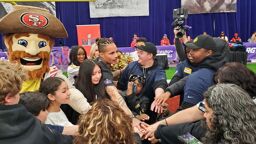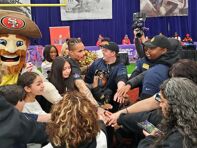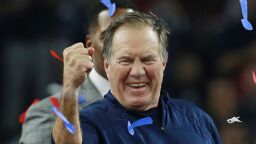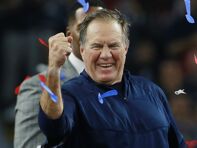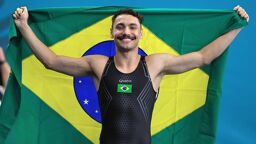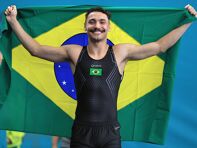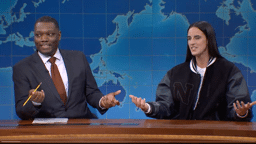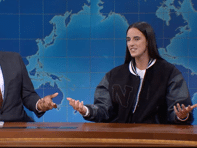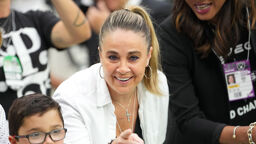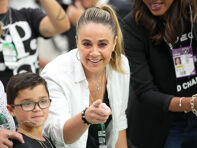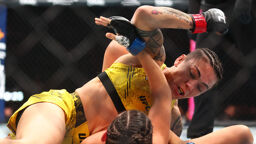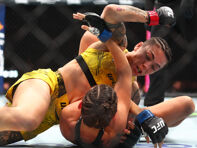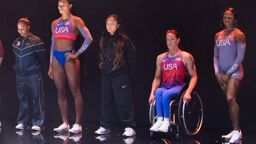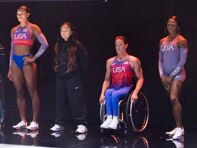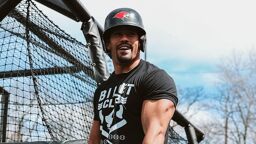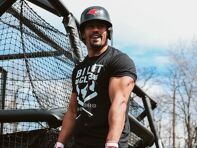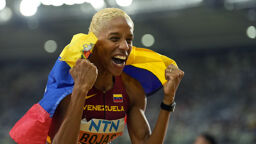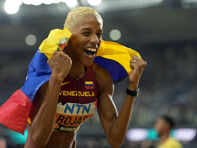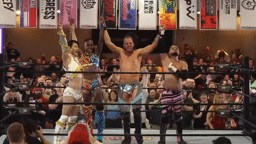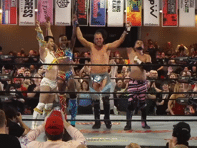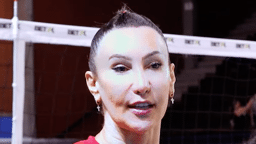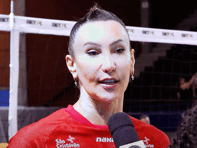As somebody who spent large chunks of his childhood getting picked last for sports at recess, I was panic-stricken when I showed up to my first day of flag football. Despite yearning to work in sports media for most of my life, I never felt comfortable picking up a ball and actually playing myself. Don’t get me wrong — I did it. But I couldn’t wait for games to be over, and prayed I was never asked to contribute in any consequential situation. (My unique combination of stone hands and slow feet ensured my prayers were answered.)
But as a young postgrad looking to make friends in Boston’s LGBTQ community, I told myself I couldn’t allow my anxiety to impede me. So there I was: running routes and participating in footwork drills for FLAG Flag Football’s open play day. The league’s captains generously doled out support, and for the first time, I felt at ease on a playing field.
This preamble is not meant to solicit sympathy, but rather to illustrate the importance of leadership when it comes to inclusion in the sports arena. As we all know, sports have traditionally not been the most welcoming place for LGBTQ people. But FLAG Flag Football, one of the largest recreational gay sports leagues in Boston, is trying to change that — one scholarship at a time.
Founded in 1998, FLAG (Friends, Lesbians, and Gays) Flag Football boasts more than 300 members. In addition to promoting sportsmanship and an all-around good time, the league stresses the importance of volunteering in the community. Each year, an average of 140 volunteers perform 1,500 community service hours, including an annual field day for LGBTQ youth.
In 2011, FLAG Flag Football devised its own scholarship to promote inclusion and award those who are making sports safe for LGBTQ kids. Named after one of the league’s stalwart members, educator Marc E. Lewis, the scholarship especially seeks out students who are creating safe spaces for their peers. The deadline for applications is March 20, though it could be extended due to school closings across the state.
“Two of the tenants of Flag Football’s mission are about building community and transforming lives through sport,” Lewis told Outsports. “I saw such an obvious overlap between the work that needs to be done in schools, and what we provide as an organization — the young people who would benefit so much from seeing our example, and provide hope for a future that they didn’t envision in the moment.”

One of the first recipients of the award, track and field athlete Philip Batler, who’s currently a senior at Brown University, was never shy about his sexuality while competing in high school. After coming out at the beginning of his junior year, Batler joined his suburban high school’s Gay Straight Alliance — which he renamed the “Gender, Sexuality and Awareness Club” — and made sure to wear Pride sweatbands and other regalia whenever he raced.
Growing up, Batler says he lacked openly gay role models in his hometown, and he wanted to fill that void for the next generation.
“I didn’t have anybody like that for me to look up to, which was really frustrating,” he told Outsports. “I just really wanted to be that role model for anybody who was younger than me on the team and could look up to me. To be perfectly honest, a lot of the confidence came my junior year, because that was my most successful year athletically. I had more confidence, because I was like, ‘What are people going to say to me now that I’m setting school records?’”
Chris Morse, who won the scholarship in 2017, also took it upon himself to be a leader in his sports community. An openly gay high school swimmer, he worked with his school’s guidance team to run a support group for kids who were still coming to terms with their sexual orientation or gender identity. Since he was captain of the swim team, Morse ensured his teammates practiced respect as well.
“One of my favorite reasons to get exercise is for the benefits it can have for your mental health,” Morse wrote to Outsports in an email. “For me, sometimes it feels like swimming saved my life. Just last night, I was talking to a friend of mine about how wild it is to feel like mental health problems are just another stage in the process of coming to terms with your own identity. Given that exercise is one of the more accessible ways to help improve mental health, I think it is extremely important that exercise of any kind should be inclusive to people from any background.”
A longtime teacher, Lewis knows the power of peer leadership. While adults can try and teach the importance of inclusion to young athletes, the message resonates best when it comes from their own peers.
“I meet so many inspirational young people who are making a profound difference in their schools and communities,” Lewis said. “We very much believe our support and encouragement could make it easier for them to go on and change the world. As lofty and hokey as that sounds, I genuinely believe that.”
At Brown, Batler continues to lead on and off the track, starting the Student-Athlete Gay Alliance, which is a safe space for closeted and out athletes to come together. As Batler can attest, the coming out journey is far easier when it is done with the support of others.
“To be perfectly honest, sometimes it’s just a venting session, but I think that’s what some people need,” Batler said. “I hope that club has a legacy after I graduate. It would be something I would look back on with a lot of pride that I helped start that.”


